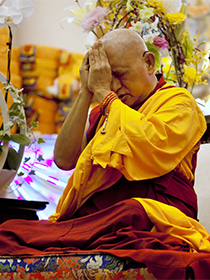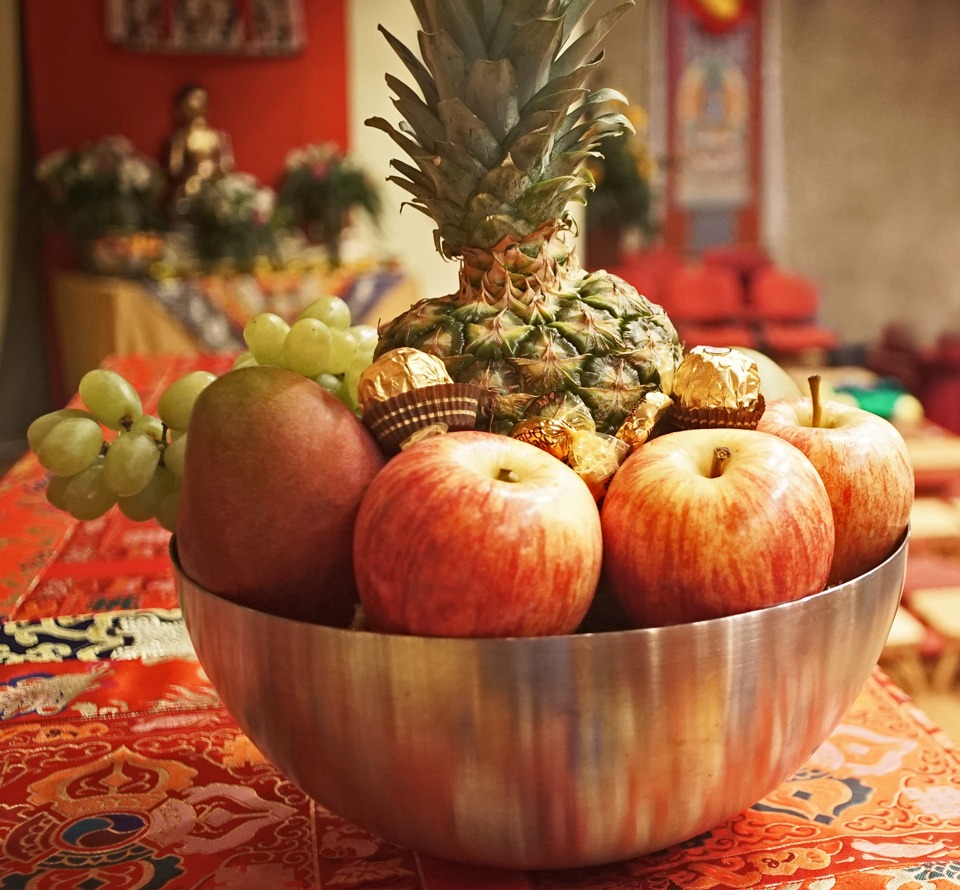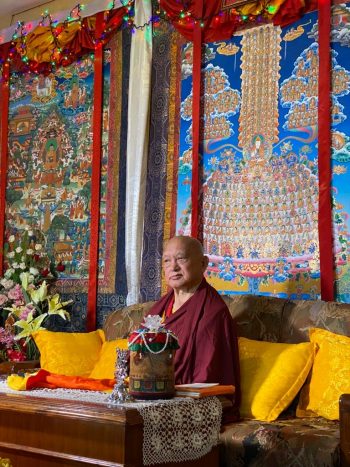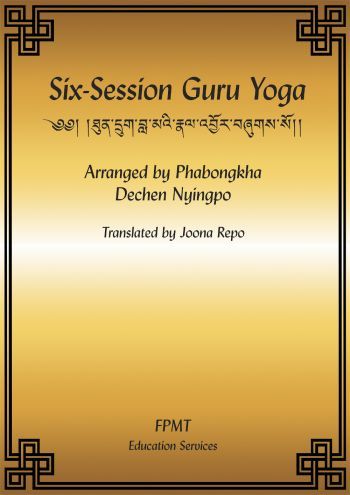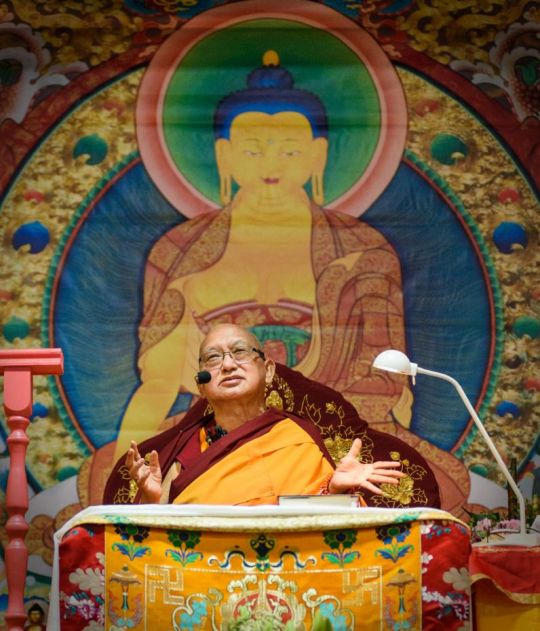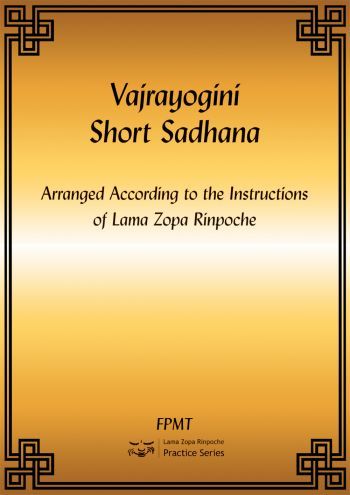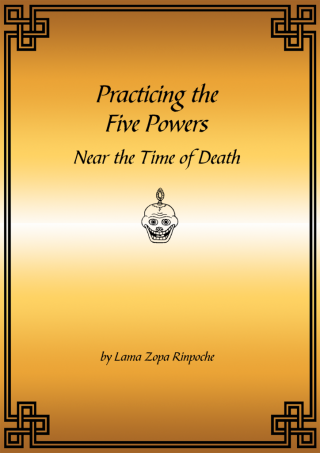- Home
- FPMT Homepage
Foundation for the Preservation of the Mahayana Tradition
The FPMT is an organization devoted to preserving and spreading Mahayana Buddhism worldwide by creating opportunities to listen, reflect, meditate, practice and actualize the unmistaken teachings of the Buddha and based on that experience spreading the Dharma to sentient beings. We provide integrated education through which people’s minds and hearts can be transformed into their highest potential for the benefit of others, inspired by an attitude of universal responsibility and service. We are committed to creating harmonious environments and helping all beings develop their full potential of infinite wisdom and compassion. Our organization is based on the Buddhist tradition of Lama Tsongkhapa of Tibet as taught to us by our founders Lama Thubten Yeshe and Lama Thubten Zopa Rinpoche.
- Willkommen
Die Stiftung zur Erhaltung der Mahayana Tradition (FPMT) ist eine Organisation, die sich weltweit für die Erhaltung und Verbreitung des Mahayana-Buddhismus einsetzt, indem sie Möglichkeiten schafft, den makellosen Lehren des Buddha zuzuhören, über sie zur reflektieren und zu meditieren und auf der Grundlage dieser Erfahrung das Dharma unter den Lebewesen zu verbreiten.
Wir bieten integrierte Schulungswege an, durch denen der Geist und das Herz der Menschen in ihr höchstes Potential verwandelt werden zum Wohl der anderen – inspiriert durch eine Haltung der universellen Verantwortung und dem Wunsch zu dienen. Wir haben uns verpflichtet, harmonische Umgebungen zu schaffen und allen Wesen zu helfen, ihr volles Potenzial unendlicher Weisheit und grenzenlosen Mitgefühls zu verwirklichen.
Unsere Organisation basiert auf der buddhistischen Tradition von Lama Tsongkhapa von Tibet, so wie sie uns von unseren Gründern Lama Thubten Yeshe und Lama Thubten Zopa Rinpoche gelehrt wird.
- Bienvenidos
La Fundación para la preservación de la tradición Mahayana (FPMT) es una organización que se dedica a preservar y difundir el budismo Mahayana en todo el mundo, creando oportunidades para escuchar, reflexionar, meditar, practicar y actualizar las enseñanzas inconfundibles de Buda y en base a esa experiencia difundir el Dharma a los seres.
Proporcionamos una educación integrada a través de la cual las mentes y los corazones de las personas se pueden transformar en su mayor potencial para el beneficio de los demás, inspirados por una actitud de responsabilidad y servicio universales. Estamos comprometidos a crear ambientes armoniosos y ayudar a todos los seres a desarrollar todo su potencial de infinita sabiduría y compasión.
Nuestra organización se basa en la tradición budista de Lama Tsongkhapa del Tíbet como nos lo enseñaron nuestros fundadores Lama Thubten Yeshe y Lama Zopa Rinpoche.
A continuación puede ver una lista de los centros y sus páginas web en su lengua preferida.
- Bienvenue
L’organisation de la FPMT a pour vocation la préservation et la diffusion du bouddhisme du mahayana dans le monde entier. Elle offre l’opportunité d’écouter, de réfléchir, de méditer, de pratiquer et de réaliser les enseignements excellents du Bouddha, pour ensuite transmettre le Dharma à tous les êtres. Nous proposons une formation intégrée grâce à laquelle le cœur et l’esprit de chacun peuvent accomplir leur potentiel le plus élevé pour le bien d’autrui, inspirés par le sens du service et une responsabilité universelle. Nous nous engageons à créer un environnement harmonieux et à aider tous les êtres à épanouir leur potentiel illimité de compassion et de sagesse. Notre organisation s’appuie sur la tradition guéloukpa de Lama Tsongkhapa du Tibet, telle qu’elle a été enseignée par nos fondateurs Lama Thoubtèn Yéshé et Lama Zopa Rinpoché.
Visitez le site de notre Editions Mahayana pour les traductions, conseils et nouvelles du Bureau international en français.
Voici une liste de centres et de leurs sites dans votre langue préférée
- Benvenuto
L’FPMT è un organizzazione il cui scopo è preservare e diffondere il Buddhismo Mahayana nel mondo, creando occasioni di ascolto, riflessione, meditazione e pratica dei perfetti insegnamenti del Buddha, al fine di attualizzare e diffondere il Dharma fra tutti gli esseri senzienti.
Offriamo un’educazione integrata, che può trasformare la mente e i cuori delle persone nel loro massimo potenziale, per il beneficio di tutti gli esseri, ispirati da un’attitudine di responsabilità universale e di servizio.
Il nostro obiettivo è quello di creare contesti armoniosi e aiutare tutti gli esseri a sviluppare in modo completo le proprie potenzialità di infinita saggezza e compassione.
La nostra organizzazione si basa sulla tradizione buddhista di Lama Tsongkhapa del Tibet, così come ci è stata insegnata dai nostri fondatori Lama Thubten Yeshe e Lama Zopa Rinpoche.
Di seguito potete trovare un elenco dei centri e dei loro siti nella lingua da voi prescelta.
- 欢迎 / 歡迎
简体中文
“护持大乘法脉基金会”( 英文简称:FPMT。全名:Foundation for the Preservation of the Mahayana Tradition) 是一个致力于护持和弘扬大乘佛法的国际佛教组织。我们提供听闻,思维,禅修,修行和实证佛陀无误教法的机会,以便让一切众生都能够享受佛法的指引和滋润。
我们全力创造和谐融洽的环境, 为人们提供解行并重的完整佛法教育,以便启发内在的环宇悲心及责任心,并开发内心所蕴藏的巨大潜能 — 无限的智慧与悲心 — 以便利益和服务一切有情。
FPMT的创办人是图腾耶喜喇嘛和喇嘛梭巴仁波切。我们所修习的是由两位上师所教导的,西藏喀巴大师的佛法传承。
繁體中文
護持大乘法脈基金會”( 英文簡稱:FPMT。全名:Found
ation for the Preservation of the Mahayana Tradition ) 是一個致力於護持和弘揚大乘佛法的國際佛教組織。我們提供聽聞, 思維,禪修,修行和實證佛陀無誤教法的機會,以便讓一切眾生都能 夠享受佛法的指引和滋潤。 我們全力創造和諧融洽的環境,
為人們提供解行並重的完整佛法教育,以便啟發內在的環宇悲心及責 任心,並開發內心所蘊藏的巨大潛能 — 無限的智慧與悲心 – – 以便利益和服務一切有情。 FPMT的創辦人是圖騰耶喜喇嘛和喇嘛梭巴仁波切。
我們所修習的是由兩位上師所教導的,西藏喀巴大師的佛法傳承。 察看道场信息:
- FPMT Homepage
- News/Media
-
- Study & Practice
-
-
- About FPMT Education Services
- Latest News
- Programs
- New to Buddhism?
- Buddhist Mind Science: Activating Your Potential
- Heart Advice for Death and Dying
- Discovering Buddhism
- Living in the Path
- Exploring Buddhism
- FPMT Basic Program
- FPMT Masters Program
- FPMT In-Depth Meditation Training
- Maitripa College
- Lotsawa Rinchen Zangpo Translator Program
- Universal Education for Compassion & Wisdom
- Online Learning Center
-
- Prayers & Practice Materials
- Overview of Prayers & Practices
- Full Catalogue of Prayers & Practice Materials
- Explore Popular Topics
- Benefiting Animals
- Chenrezig Resources
- Death & Dying Resources
- Lama Chopa (Guru Puja)
- Lama Zopa Rinpoche: Compendium of Precious Instructions
- Lama Zopa Rinpoche: Life Practice Advice
- Lama Zopa Rinpoche Practice Series
- Lamrim Resources
- Mantras
- Prayer Book Updates
- Purification Practices
- Sutras
- Thought Transformation (Lojong)
- Audio Materials
- Dharma Dates - Tibetan Calendar
- Translation Services
- Publishing Services
- Ways to Offer Support
- Prayers & Practice Materials
-
- Teachings and Advice
- Find Teachings and Advice
- Lama Zopa Rinpoche Advice Page
- Lama Zopa Rinpoche: Compendium of Precious Instructions
- Lama Zopa Rinpoche Video Teachings
- ༧སྐྱབས་རྗེ་བཟོད་པ་རིན་པོ་ཆེ་མཆོག་ནས་སྩལ་བའི་བཀའ་སློབ་བརྙན་འཕྲིན།
- Podcasts
- Lama Yeshe Wisdom Archive
- Buddhism FAQ
- Dharma for Young People
- Resources on Holy Objects
- Teachings and Advice
-
-
*If a menu item has a submenu clicking once will expand the menu clicking twice will open the page.
-
-
- Centers
-
- Teachers
-
- Projects
-
-
-
-
*If a menu item has a submenu clicking once will expand the menu clicking twice will open the page.
-
-
- FPMT
-
-
-
-
-
To put an end to our samsaric suffering, we must do two things: One is to purify the negative actions we’ve done every day of our lives and in our infinite previous lives as well. We also have to change our minds and actions and abstain from creating further negativities.
Lama Zopa Rinpoche
-
-
-
- Shop
-
-
-
The Foundation Store is FPMT’s online shop and features a vast selection of Buddhist study and practice materials written or recommended by our lineage gurus. These items include homestudy programs, prayers and practices in PDF or eBook format, materials for children, and other resources to support practitioners.
Items displayed in the shop are made available for Dharma practice and educational purposes, and never for the purpose of profiting from their sale. Please read FPMT Foundation Store Policy Regarding Dharma Items for more information.
-
-
Study & Practice News
4
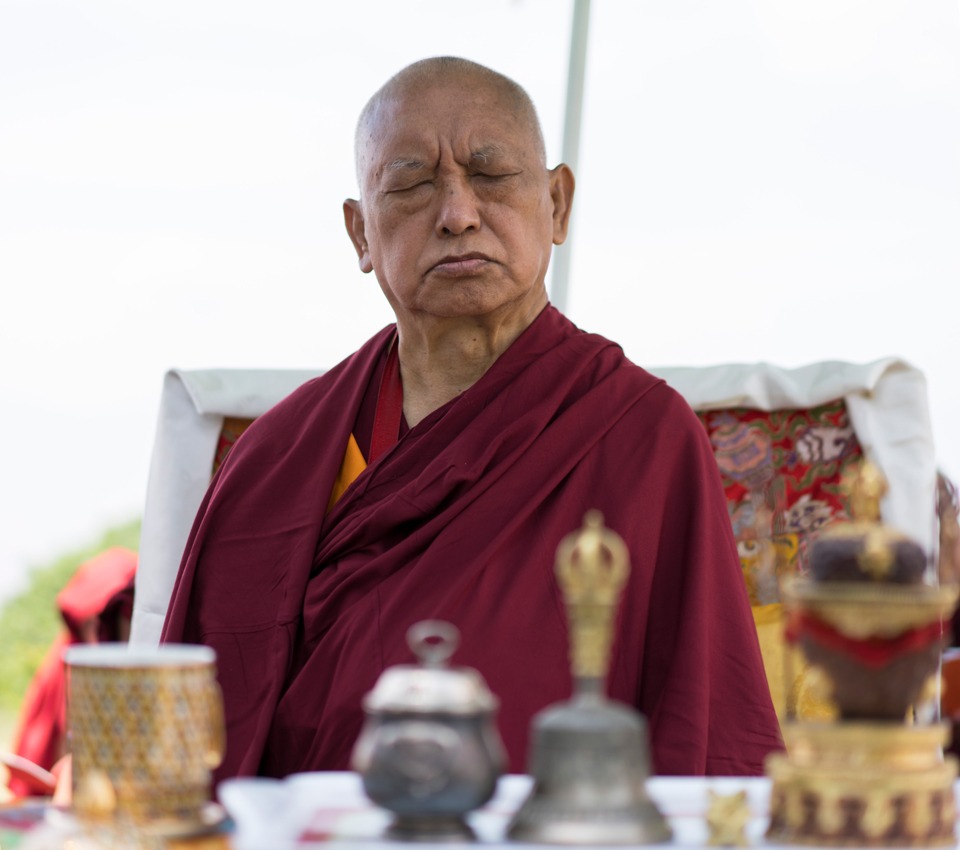
Lama Zopa Rinpoche doing an incense puja at Kopan Monastery, Nepal, April 2020. Photo by Ven. Lobsang Sherab.
Recently, Lama Zopa Rinpoche described the multiplying effects of the fifteenth day of Saka Dawa, a Buddhist holy day, which this year is on June 5.
Saka Dawa commemorates three of the Buddha’s major life events—the Buddha’s birth, enlightenment, and parinirvana. Each event is considered to multiply the power of actions done on this day, both auspicious and harmful, by one hundred million. Rinpoche clarified that on Saka Dawa, the power of actions is actually multiplied by three hundred million, not just one hundred million.
During this year’s Saka Dawa, there is also a lunar eclipse. During the actual time of the eclipse, the power of actions is further multiplied by seven hundred thousand, bringing the total multiplying effect of this year’s Saka Dawa to three hundred million seven hundred thousand (300,700,000).
Rinpoche reminds students that this is an incredible day to focus on auspicious and meaningful practices and activities.
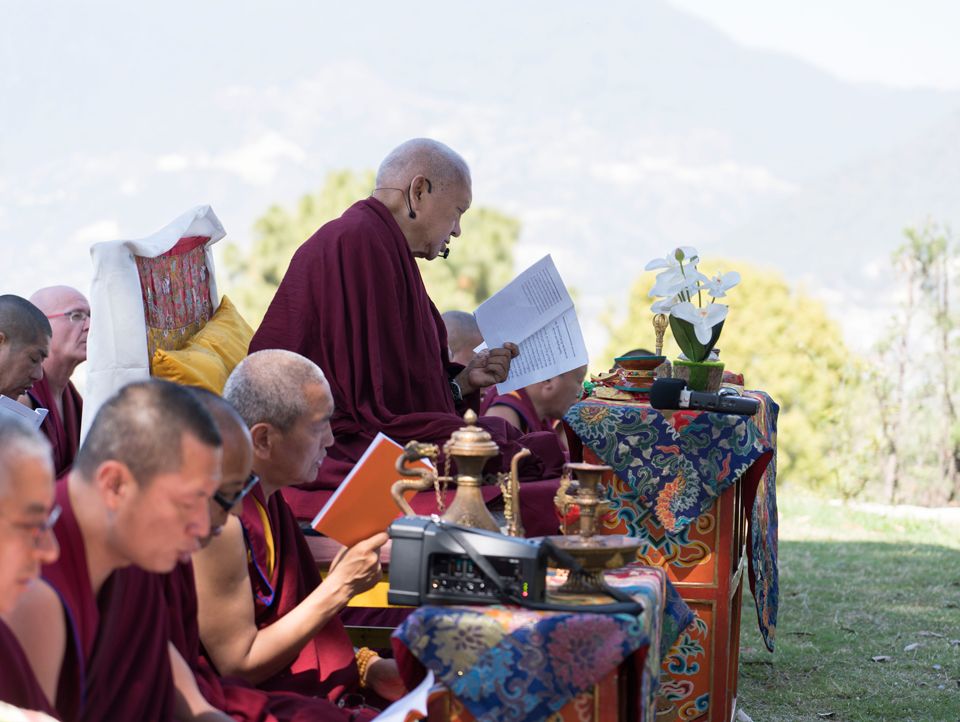
Lama Zopa Rinpoche doing incense puja at Kopan Monastery, Nepal, March 2020. Photo by Ven. Losang Sherab.
According to Ven. Choden Rinpoche, one of Lama Zopa Rinpoche’s teachers, observation of auspicious days should be according to the date in India, not the date in one’s home country. Therefore, when Lama Zopa Rinpoche is not in India, Rinpoche celebrates auspicious dates according to the time in India.
Special thanks to the Liberation Prison Project for preparing a Tibetan calendar with information on holy days and other important dates for avoiding or engaging in various activities.
Through comprehensive study programs, practice materials, and training seminars, FPMT Education nourishes the development of compassion, wisdom, kindness, and true happiness in individuals of all ages.
- Tagged: merit multiplying day, saka dawa
21
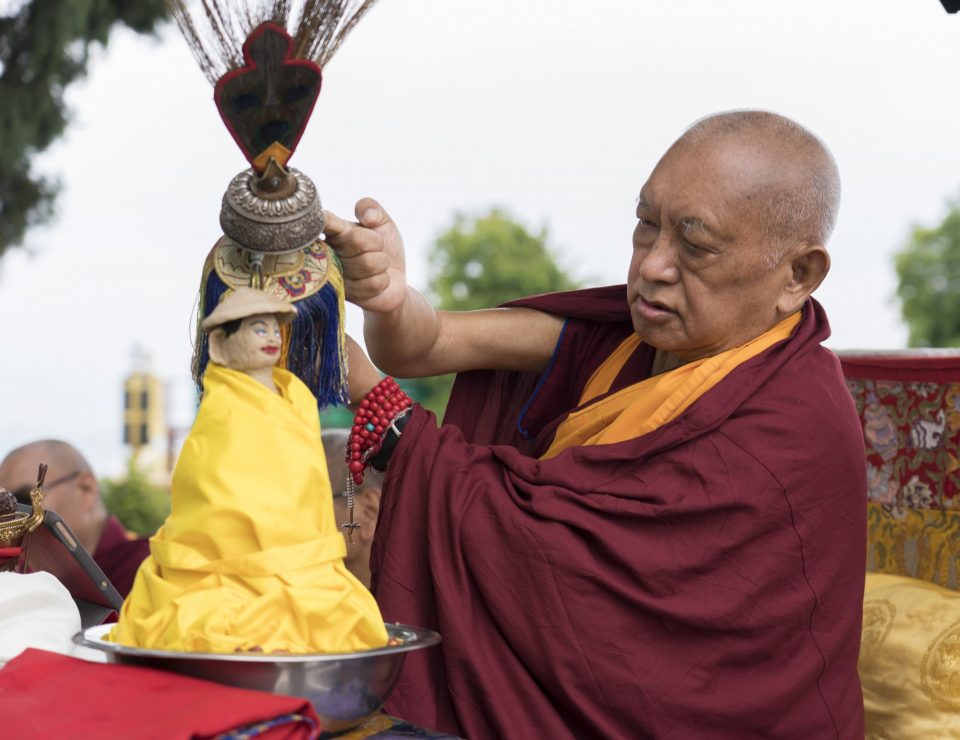
Lama Zopa Rinpoche performing a puja at Kopan Monastery, Nepal, April 2020. Photo by Ven. Lobsang Sherab.
An auspicious merit multiplying day, the full moon of the month of Saka Dawa, is coming up on June 5.
The fifteenth day of Saka Dawa is one of the four great holy days of the Tibetan calendar, commemorating Shakyamuni Buddha’s enlightenment and parinirvana. Any actions done on this day, both auspicious and harmful, are magnified in their power. Karmic results are multiplied by one hundred million, as cited by Lama Zopa Rinpoche in the vinaya text Treasure of Quotations and Logic. This year’s fifteenth day of Saka Dawa also falls on a lunar eclipse, multiplying karmic results by a further seven hundred thousand while the eclipse lasts.
In November 2019, Rinpoche wrote out this specific advice for merit multiplying days and eclipses:
What are the merit multiplying days? They are the fifteen days of Losar (Chotrul Duchen), Saka Dawa, Chokhor Duchen, and Lhabab Duchen. Also, there are solar eclipses. Once the day starts, then the merit is multiplied by one hundred million times.
So what can you do on these days?
-
- You can rejoice in your, other sentient beings’, and the buddhas’ three times’ merits.
- You can read the Vajra Cutter Sutra, Chanting the Names of Manjushri, and King of Prayers.
- You can meditate on emptiness, and especially meditate on bodhichitta, with whichever technique.
- You can do Lama Chopa. At either the beginning of Lama Chopa or during the lamrim section, you can meditate on emptiness.
- Whatever activity they are doing at your local FPMT center, you can join them.
- Of course, you can do self-initiation—that is the best one.
- You can do prostrations by reciting the Thirty-Five Buddha prayer.
- You can make more offerings or help sentient beings more. Liberate animals or, with bodhichitta, practice charity to people or animals—you can do whatever you can.
- Recite OṂ MAṆI PADME HŪṂ with bodhichitta.
- Of course, don’t forget that the best practice is bodhichitta, tonglen.
Keep this advice, especially in order to educate and help others, the numberless sentient beings.
It is so important also to understand that if one collects non-virtue on merit multiplying days, then that will also increase by that many number of times. One has to be careful to not increase non-virtuous actions during the merit multiplying days, as well as during solar eclipses. (When there is a lunar eclipse, the merit is only increased by seven hundred thousand times!)
The longest period of time when merit is multiplied so much is during the Fifteen Days of Miracles (i.e., the fifteen days of Losar). To know this is unbelievable. During all those days one can create so much merit!
Please help by letting sentient beings know, so that they can achieve full enlightenment soon.
I received this information that the merit is multiplied one hundred million times from His Holiness Chobgye Trichen Rinpoche. It comes from Dulwa Lung (‘dul ba lung). Often in Tibetan calendars it says that the merit is only increased one hundred thousand times, but that is not right. It is one hundred million times.
Written by Lama Zopa Rinpoche, November 2019, United States. Edited by Michael D. Jolliffe for publication on FPMT.org.
According to Ven. Choden Rinpoche, one of Lama Zopa Rinpoche’s teachers, observation of auspicious days should be according to the date in India, not the date in one’s home country. Therefore, when Lama Zopa Rinpoche is not in India, Rinpoche celebrates auspicious dates according to the time in India.
Additional advice for practices to do on merit multiplying days can be found here, including advice to recite the Sutra Remembering the Three Jewels.
If you choose to recite the Sutra of Golden Light on this or any other day, don’t forget to report your recitations, which can be done on the Sutra of Golden Light reporting page.
The eight Mahayana precepts are a set of special and powerful vows taken for twenty-four hours. You can take the eight Mahayana precepts from a specially created video of Lama Zopa Rinpoche offering the precepts. “Taking the eight Mahayana precepts is a way to make life meaningful, to take its essence all day and night, by taking vows,” Lama Zopa Rinpoche has taught. “It is so simple. It is just for one day. Just for one day. It makes it so easy.”
Special thanks to the Liberation Prison Project for preparing a Tibetan calendar with information on holy days and other important dates for avoiding or engaging in various activities.
Through comprehensive study programs, practice materials, and training seminars, FPMT Education nourishes the development of compassion, wisdom, kindness, and true happiness in individuals of all ages.
- Tagged: merit multiplying day, saka dawa
29
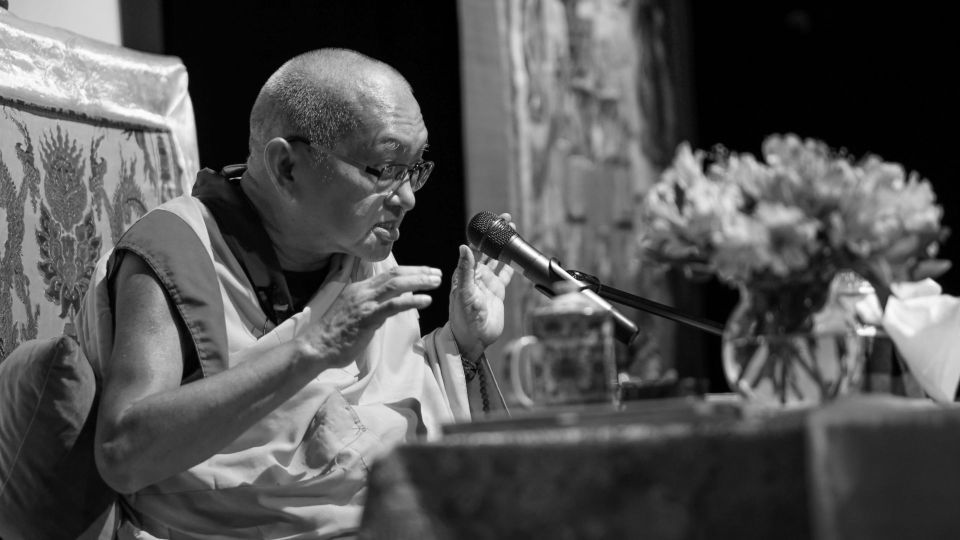
Lama Zopa Rinpoche, Thubten Norbu Ling, Santa Fe, New Mexico, United States, August 2017. Photo by Ven. Lobsang Sherab.
In a teaching titled “Sentient Beings Come before God and Mantras to Benefit Others,” part of Lama Zopa Rinpoche’s COVID-19 Crisis Teachings, Rinpoche discussed the benefits of reciting the holy name of Buddha Rinchen Tsugtor Chen. Lama Zopa Rinpoche has frequently spoken about how reciting the name of this buddha is the very first thing to do to support someone who is dying:
“When an animal or person is dying—now, this hour, today, or in several hours, whatever—the first thing to recite is [the name of Buddha Rinchen Tsugtor Chen,]” Lama Zopa Rinpoche taught in August 2017 at Thubten Norbu Ling in Santa Fe, New Mexico, in the United States.
Rinpoche continued with a recitation of the mantra and additional advice:
“CHOM DÄN DÄ DE ZHIN SHEG PA DRA CHOM PA YANG DAG PAR DZOG PÄI SANG GYÄ RIN CHHEN TSUG TOR CHÄN LA CHHAG TSHÄL LO
To Bhagavan, Tathagata, Arhat, Perfectly Complete Buddha, Precious Ushnisha, I prostrate.
“Then after that, you do a short Medicine Buddha practice. If you recite it to an animal loudly, if a person or animal hears it, they will never get born in lower realms. You must write that down in your ‘diarrhea’ [diary] book.”
In 2010 during the Light of the Path retreat, Rinpoche gave more extensive teachings on the name:
“In one of Buddha’s past life stories, it says that tens of thousands of fish were dying due to their pond having dried out. He brought water from very far away and chanted this buddha’s mantra to the fish: CHOM DÄN DÄ DE ZHIN SHEG PA DRA CHOM PA YANG DAG PAR DZOG PÄI SANG GYÄ RIN CHHEN TSUG TOR CHÄN LA CHHAG TSHÄL LO. Due to this, they were all reborn in the Deva Realm of the Thirty-Three. Then they all came down to thank him together with a rainfall of flowers. There are quite a few stories about this verse.
“It is very good to learn it and to write it down because if an animal or a person is dying, this is the very first thing to recite to them. But don’t recite it like you are reciting it for yourself, so the other person doesn’t hear it. The other person has to hear it! Don’t mumble; you have to recite it loudly. Since the person who is dying has to hear it, get near their ear and recite it loudly. Even if there are many other practices you are going to do for the dying person, phowa, Medicine Buddha puja, or any other practice, the first thing to do is to recite CHOM DÄN DÄ DE ZHIN SHEG PA DRA CHOM PA YANG DAG PAR DZOG PÄI SANG GYÄ RIN CHHEN TSUG TOR CHÄN LA CHHAG TSHÄL LO. If the other person is able to hear that, it is impossible for them to be reborn in the lower realms. Therefore, it is very important. It is also very short (Rinpoche snaps his fingers) and it is done. Whatever else you are going to do, first do that. Also, even if you cannot be sure when the person is going to die, [you can recite it because] if the person or animal hears that verse, they will never get reborn in the lower realms. Even for animals and insects, it is unbelievably powerful.”
Listen to Rinpoche recite the holy name of Buddha Rinchen Tsugtor Chen:
https://youtu.be/joH14-PjPOQ
Find more advice and video teachings by Lama Zopa Rinpoche from Kopan Monastery during the COVID-19 crisis:
https://fpmt.org/fpmt/announcements/resources-for-coronavirus-pandemic/advice-from-lama-zopa-rinpoche-for-coronavirus/
For more on mantras, visit FPMT Education’s mantra resource page:
https://fpmt.org/education/prayers-and-practice-materials/mantras/
For more practices and resources for the dead and dying, please visit:
https://fpmt.org/death/
Through comprehensive study programs, practice materials, and training seminars, FPMT Education nourishes the development of compassion, wisdom, kindness, and true happiness in individuals of all ages.
- Tagged: rinchen tsugtor chen
26
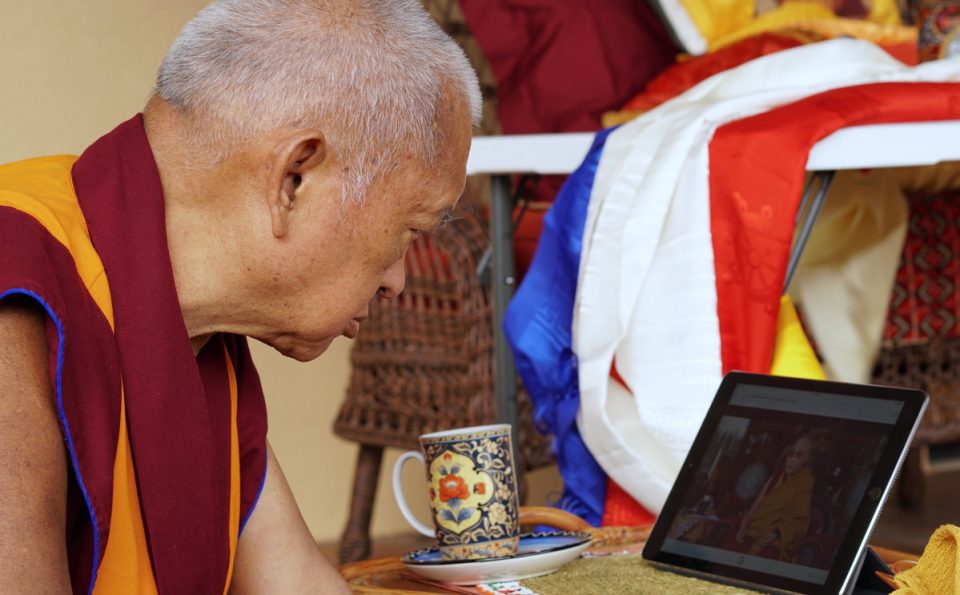
Lama Zopa Rinpoche watching a teaching with His Holiness the Dalai Lama on a tablet. Photo by Ven. Lobsang Sherab.
Dharma practitioners around the world have been advised to isolate themselves from others as much as possible to reduce the spread of the coronavirus. This can be a challenge to those wishing to study without access to their local centers.
We are offering several FPMT Online Learning Center programs to any student or center who would like to use them. (Please note: Students who are new to the Online Learning Center will need to create an account. For details, see “Getting Started Guide.”)
- Discovering Buddhism: Module 11, Transforming Problems
Enrollment key: tonglen33 - Basic Program: Mahayana Mind Training, Wheel of Sharp Weapons
Enrollment key: lojong100 - Living in the Path
We have made this entire program available for free. Find the enrollment keys for the individual modules here. - Living in the Path (Spanish)
This program is also in Spanish and is available for free. Find the enrollment keys for individual modules here. - Discovering Buddhism (French)
All of the modules of Discovering Buddhism in French are available for free and do not require enrollment keys.
Additionally, students are welcome to access complete teachings of Lama Zopa Rinpoche via Rinpoche Available Now. Find video of recent and archive teachings from Nepal, Russia, Singapore, Latvia, France, and many other teaching events.
Please also visit the Lama Yeshe Wisdom Archive for freely available teachings by Lama Yeshe and Lama Zopa Rinpoche in a variety of digital formats.
We hope that students will take full advantage of these opportunities during this isolating time of uncertainty.
For detailed advice on the practices recommended by Lama Zopa Rinpoche to mitigate the coronavirus pandemic, please visit the page “Advice from Lama Zopa Rinpoche for Coronavirus.”
https://fpmt.org/fpmt/announcements/resources-for-coronavirus-pandemic/advice-from-lama-zopa-rinpoche-for-coronavirus/
Through comprehensive study programs, practice materials, and training seminars, FPMT Education nourishes the development of compassion, wisdom, kindness, and true happiness in individuals of all ages.
- Tagged: coronavirus, covid-19, online education
25
A new video from Lama Zopa Rinpoche focuses on advice for students supporting someone who is dying. Rinpoche recorded this video in March 2020 at Kopan Monastery in Nepal.
In the video, Lama Zopa Rinpoche recites various mantras and teaches on their benefits. These mantras can be used to support a person who is dying.
Rinpoche teaches on:
- Buddha’s Name Mantra (Rinchhen Tsugtorchen Name Mantra)
- the short Chenrezig mantra
- Lotus Pinnacle of Amoghaspasha Mantra
- Celestial Mansion Extremely Secret Sublime Success
- Maitreya Buddha mantras (root mantra, heart mantra, and close heart mantra)
- the short Medicine Buddha mantra
- the short Namgyalma mantra
- Mantra from “The Sutra of Great Liberation”
Watch “Lama Zopa Rinpoche’s Advice to a Person Who is Dying” on YouTube:
https://youtu.be/wmIVjkVDyVE
- Read the transcript of this teaching.
- Find the mantras to recite for the dying discussed in this video.
- Find additional resources for the dying and other mantras on FPMT.org.
For detailed advice on the practices recommended by Lama Zopa Rinpoche for the coronavirus pandemic, please visit the page “Advice from Lama Zopa Rinpoche for Coronavirus.”
Additional resources, including Dharma study-from-home opportunities, can be found on the page “Resources for the Coronavirus Pandemic.”
Lama Zopa Rinpoche is the spiritual director of the Foundation for the Preservation of Mahayana Tradition (FPMT), a Tibetan Buddhist organization dedicated to the transmission of the Mahayana Buddhist tradition and values worldwide through teaching, meditation and community service.
- Tagged: coronavirus, covid-19, death and dying, lama zopa rinpoche thought transformation video teaching, video
23
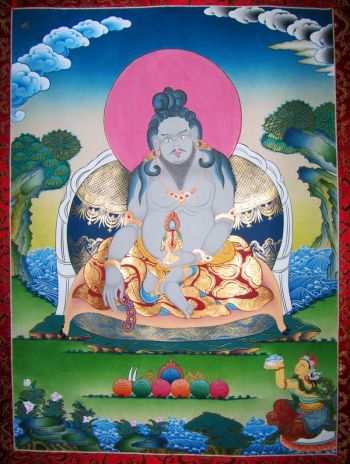
Thangtong Gyalpo
We recently shared a new video from Lama Zopa Rinpoche in which Rinpoche shares his advice for practices concerning protection and healing from coronavirus disease (COVID-19) as well as oral transmissions of the Vajra Armor mantra and four other recommended prayers.
FPMT Education Services is pleased to share a draft transcript of this advice. All are welcome to download this to your device or read online.
For more detailed advice on the practices recommended by Rinpoche, please visit the page “Advice from Lama Zopa Rinpoche for Coronavirus.”
Additional resources for this difficult time, including Dharma study-from-home opportunities, can be found on the page “Resources for the Coronavirus Pandemic.”
Through comprehensive study programs, practice materials, and training seminars, FPMT Education nourishes the development of compassion, wisdom, kindness, and true happiness in individuals of all ages.
12
Students can now find two newly translated texts relevant to the practice of six-session guru yoga, often given in the Gelug tradition as a daily practice commitment to all those who have received a highest yoga tantric initiation, in ebook and PDF formats in the Foundation Store.
Six-Session Guru Yoga, translated by Joona Repo, contains three versions of the guru yoga practice that Phabongkha Dechen Nyingpo arranged together and briefly commented on. It is recommended by both Phabongkha and Lama Zopa Rinpoche that students practice the extensive or abbreviated versions of the practice instead of the single-verse version.
Phabongkha’s work also serves as the basis of Six-Session Guru Yoga Commentary, Lama Zopa Rinpoche’s in-depth teachings on the six-session guru yoga practice. This text, recently updated, provides Rinpoche’s commentary on the benefits of the practice, how to meditate on each verse of the sadhana, and the samayas of the five buddha families. The commentary uses the extensive version of the six-session guru yoga practice as its basis.
Note: You need to have received an initiation (wang) of the yoga tantra or highest yoga tantra class in order to read these commentaries of the six-session guru yoga. These texts are restricted to only those with the appropriate tantric initiation. If you are unsure whether you are qualified or not, please email us at education@fpmt.org.
Through comprehensive study programs, practice materials, and training seminars, FPMT Education nourishes the development of compassion, wisdom, kindness, and true happiness in individuals of all ages.
- Tagged: six-session guru yoga
5
“If animals hear this Namgyalma mantra, it is last time they will be animals; they will never get reborn in lower realms at all, ” Lama Zopa Rinpoche taught in Ganden Tendar Ling in Moscow, Russia, in 2017. “They will always get higher rebirths, always meet buddhas and bodhisattvas, always have a pure life, always go to enlightenment, and never return to the lower realms. The Namgyalma mantra has great benefit. Even if animals hear, it is their last time being an animal. So, there is no question it is the same for human beings.”
Rinpoche spoke more about the benefits of the mantra in “The Benefits of Namgyalma Mantra,” found in the August-September 2008 issue of Mandala.
“Also it is mentioned in the commentary on Namgyalma’s mantra:
“If one recites this mantra twenty-one times, then blows on yellow mustard seeds and throws them on the bones of the sentient being who has accumulated much negative karma and has died, even if that sentient being has been reborn as a hell being, a preta, an animal, in the world of Yama, or in other evil transmigratory realms, because of the power of this mantra he will be liberated from those unfortunate realms.
“Namgyalma is a deity for long life and purification. The mantra has infinite benefits; it is so powerful. It is said that for anyone who hears this mantra, this will be the last time that person is born in the womb. If animals hear it, they will not be reborn in the lower realms.
“The kind and compassionate Guru Shakyamuni Buddha taught the benefits of reciting the Namgyalma mantra to the Four Guardians. If you wash the body, wear clean clothes and, while living in the eight precepts, recite the mantra 1,000 times, even if you are in danger of death due to the lifespan accorded by past karma finishing, your lifespan can be prolonged, the obscurations are purified, and you are freed from disease.
“If you recite the mantra in the ears of animals, it will ensure that this is their last animal rebirth. If somebody has a very heavy disease that doctors cannot diagnose, by doing the practice mentioned above, the patient will be liberated from the disease. They will not be reborn in the lower realms ever again. After death, you will be reborn in the blissful realm, the pure land. For humans, it makes the present life the last rebirth from a womb. If you recite this mantra twenty-one times, blow on mustard seeds, and then throw them on the bones of very evil beings who have created many heavy negative karmas, even those beings will be immediately liberated from the lower realms and will be reborn in a higher realm, such as those of the devas. By throwing the seeds on bones or dead bodies, the mantra affects the consciousness and purifies it, even though the beings have already been reborn in the hells or any of the lower realms, and those beings are reborn in the deva realms and so on. …”
Listen to Rinpoche recite the long and short Namgyalma mantras:
https://youtu.be/a7mDVdUbPLg
Note: Listening to this recording does not count as receiving the oral transmission, which must be done in person. However, students do receive the benefits of reciting the mantra, as taught by Lama Zopa Rinpoche, whether they have received the oral transmission or not.
Find more Namgyalma mantra items in the FPMT Foundation Store:
https://shop.fpmt.org/search.asp?keyword=namgyalma&search=
For more on mantras, visit FPMT Education’s mantra resource page:
https://fpmt.org/education/prayers-and-practice-materials/mantras/
Through comprehensive study programs, practice materials, and training seminars, FPMT Education nourishes the development of compassion, wisdom, kindness, and true happiness in individuals of all ages.
- Tagged: namgyalma mantra
27
Vajrayogini Sadhanas from FPMT
Students can now find the short, middle-length, and long sadhanas of Vajrayogini composed by Phabongkha Dechen Nyingpo available by donation through the Foundation Store in ebook and PDF formats.
Two versions of the short sadhana are available: A Short Daily Practice of Venerable Vajrayogini Naro Khechari, Phabongkha Dechen Nyingpo’s original, and, Vajrayogini Short Sadhana, the same text arranged according to the instructions of Lama Zopa Rinpoche. Vajrayogini Short Sadhana is part of the Lama Zopa Rinpoche Practice Series, a special collection of practice materials that serves to present and preserve Rinpoche’s lineage of practice, oral instructions, and translations.
“[Vajrayogini] is the totally developed female aspect energy, female buddha, and the totality quality that is … beyond duality, beyond the energy of ego,” taught FPMT founder Lama Thubten Yeshe. “The purpose of this yoga method is to identify oneself with that divine totality quality. Thus, this method strongly emphasizes wisdom, to lead us on the quickest path to enlightenment.”
“This yoga method is so powerful. In this twentieth century we have super delusion, super sense concrete delusion, and especially super grasping at concrete sense pleasure. Thus, we are urgently, badly, in need of a wisdom method to transform it… This yoga method is for the transformation of emotion. Vajrayogini has a kind of super radiating red light body that has the quality of transforming all suffocated emotion, all blocked energy, transforming it into the divine quality.”
Note: In order to perform these practices, you must have received a highest yoga tantra initiation and the blessing initiation (jinlab) of Vajrayogini. If you are unsure whether you are qualified or not, please email us at education@fpmt.org.
Through comprehensive study programs, practice materials, and training seminars, FPMT Education nourishes the development of compassion, wisdom, kindness, and true happiness in individuals of all ages.
20
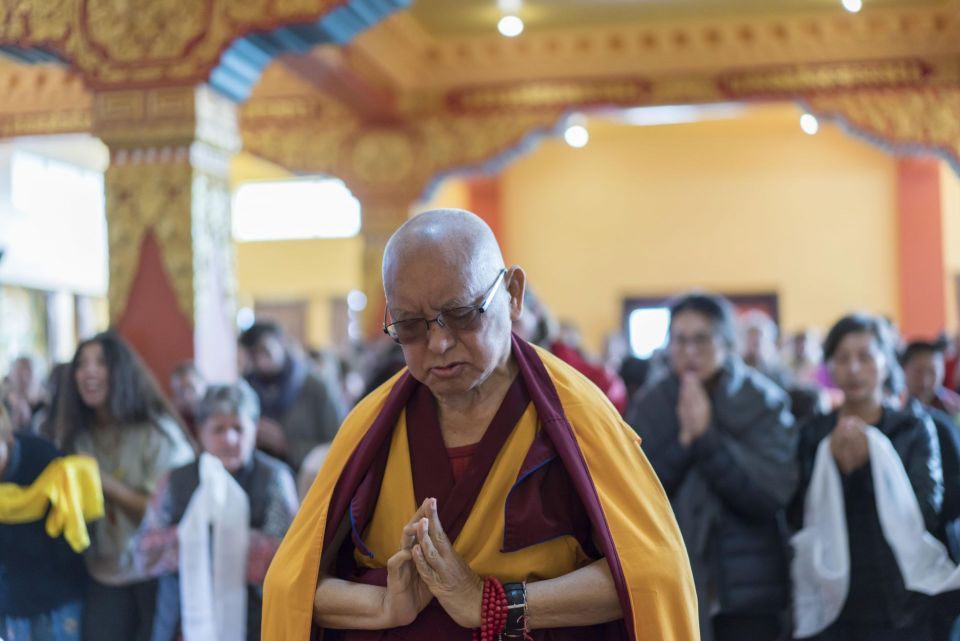
Lama Zopa Rinpoche leading prostrations before teaching, Kopan Monastery, Kathmandu, Nepal, November 2019. Photo by Ven. Lobsang Sherab.
In the complimentary Living in the Path module “The Eight Mahayana Precepts,” Lama Zopa Rinpoche shows us the importance of taking and keeping these special one-day vows based on the Mahayana motivation of bodhichitta. If you have not previously received the lineage of the eight Mahayana precepts from a teacher, Lama Zopa Rinpoche has given special permission to take the lineage from him via the video “Actual Ceremony for Taking the Precepts,” which is part of the course materials.
“Taking the eight Mahayana precepts is another way to make life meaningful, to take its essence all day and night, by taking vows,” Lama Zopa Rinpoche has taught. “It is so simple. It is just for one day. Just for one day. It makes it so easy. It’s not for a lifetime.”
In this short introductory video to the module, Ven. Paloma Alba explains the reason for taking the eight Mahayana precepts and the benefits of keeping them.
Watch “Taking the Eight Mahayana Precepts—An Introduction” on YouTube:
https://youtu.be/wDSbB3DHnsA
Ven. Paloma Alba (Tenzin Chokyi) did her first Buddhist course on the island of Ibiza in the Balearic Islands in 1982 and ordained in 1986. Since then she has offered service in a variety of FPMT centers in Spain, where she has also taught extensively. She is currently tutor for the FPMT Basic Program at Centro Nagarjuna Valencia in Valencia, Spain. Ven. Paloma is an FPMT registered teacher.
Living in the Path is an online lamrim course taught by Lama Zopa Rinpoche available through the FPMT Online Learning Center:
https://onlinelearning.fpmt.org/course/index.php?categoryid=5
Through comprehensive study programs, practice materials, and training seminars, FPMT Education nourishes the development of compassion, wisdom, kindness, and true happiness in individuals of all ages.
13
Practicing the Five Powers Near the Time of Death by Lama Zopa Rinpoche is available through the Foundation Store in ebook and PDF formats.
Practicing the Five Powers Near the Time of Death contains advice and commentary to help ensure a peaceful death and positive rebirth. Although this book was intended for use by those facing imminent death, it is a deeply profound teaching on how to live life for anyone who wishes to make their life and eventual death most meaningful.
Rinpoche explains, “When you practice the five powers, every single thing you do is only for numberless sentient beings and therefore, everything you do only becomes the cause for achieving the peerless happiness of full enlightenment. This is the greatest profit that can be achieved with this life and so this practice is the most beneficial one for achieving peerless happiness. It means that every single action you do, whether it is meditation and prayers or doing your job, becomes the cause of happiness for all sentient beings. This means that you will have the best, happiest life now and also the best, happiest life in the future – like the sun shining in this world and eliminating all darkness.”
Through comprehensive study programs, practice materials, and training seminars, FPMT Education nourishes the development of compassion, wisdom, kindness, and true happiness in individuals of all ages.
- Tagged: death, death and dying, impermanence and death
6
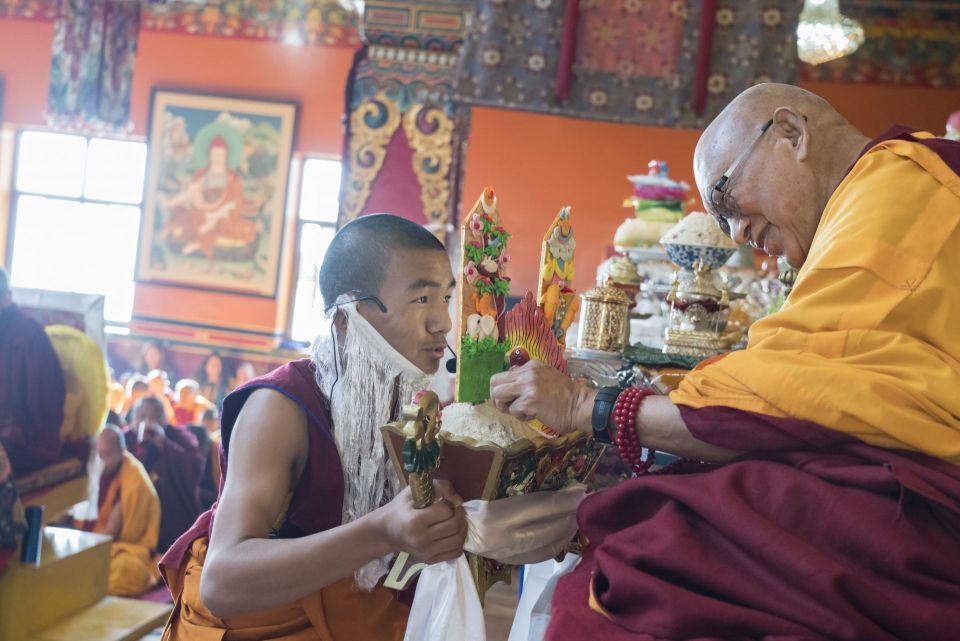
Lama Zopa Rinpoche takes a pinch of chemar, a mixture of butter and roasted barley flour, in celebration of the new year, Kopan Monastery, Kathmandu, Nepal, February 2019. Photo by Ven. Lobsang Sherab.
The Fifteen Days of Miracles—from the first day of the Tibetan new year (Losar, February 24) until the fifteenth (March 9)—commemorate the special time when Guru Shakyamuni Buddha showed miraculous powers in order to subdue six tirthika, or non-Buddhist teachers, who lacked faith in him, and to inspire more faith in his followers. It culminates on the full moon, the fifteenth day of the lunar calendar, which is the actual day of Chotrul Duchen.
Losar is traditionally celebrated for three days, during which Tibetans spend time with friends and family, eat, play games, and relax. A number of rituals and customs have developed around it, such as the eating of a special soup called “guthug” on the 29th day of the last Tibetan month of the year, two days before Losar. In the monasteries, there is a Losar tradition to do the extensive Palden Lhamo puja before dawn.
The Fifteen Days of Miracles are also a time for pilgrimage and intensive Dharma practice. During this period, many Tibetan monasteries, including Kopan Monastery in Nepal, hold a Great Prayer Festival—Monlam Chenmo—for several days or even weeks during which the Sangha recite prayers from morning until evening.
This year, Losar falls on February 24. The Fifteen Days of Miracles continue through Chotrul Duchen on March 9.
All fifteen days are merit multiplying days, when the merit of virtuous actions performed on these days is multiplied by 100 million, as cited by Lama Zopa Rinpoche from the vinaya text Treasure of Quotations and Logic.
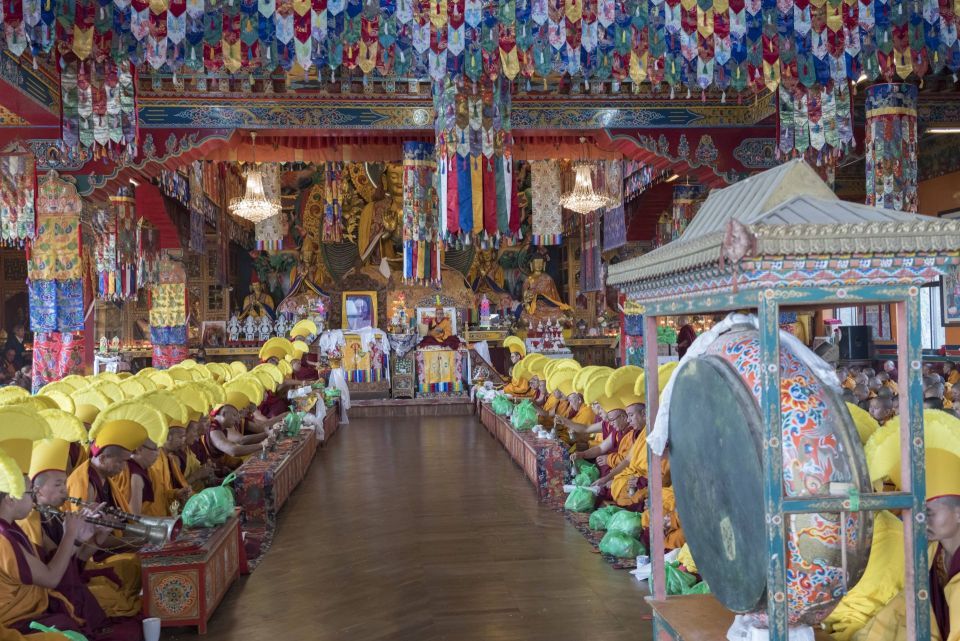
Lama Zopa Rinpoche presides over a Losar puja, Kopan Monastery, Kathmandu, Nepal, February 2019. Photo by Ven. Lobsang Sherab.
Advice Specifically for Losar
For FPMT, Losar is a special time as it commemorates the anniversary of FPMT founder Lama Yeshe’s parinirvana at dawn of Losar in 1984. Lama Zopa Rinpoche asks centers to offer students the opportunity to offer extensive Lama Chopa with tsog in honor of this anniversary. Lama Zopa Rinpoche says that one generates incredible merit by offering tsog on that occasion every year. This Losar marks thirty-six years since the passing of Lama.
Rinpoche also recommends that centers host annual events to introduce new students to Lama Yeshe. These events might include students who knew Lama Yeshe sharing their favorite stories, watching videos of Lama teaching, or reading stories about Lama.

Lama Yeshe, Lake Arrowhead, California, United States, 1975. Photo by Carol Royce-Wilder, courtesy of Lama Yeshe Wisdom Archive.
Advice for the Fifteen Days of Miracles
Advice for merit multiplying days in general can be found here. (Advice for merit multiplying days can also be found in French.)
If the members of your community decide to recite the Sutra of Golden Light on these special days, we invite them to report their recitations on the Sutra of Golden Light reporting page.
Losar Tashi Delek! Happy Tibetan New Year!
Please keep in mind: According to the late Ven. Choden Rinpoche, one of Lama Zopa Rinpoche’s teachers, observation of auspicious days should be according to the date in India, not the date in one’s home country. Therefore, when Lama Zopa Rinpoche is not in India, Rinpoche celebrates merit multiplying days and other auspicious dates according to the time in India.
On merit multiplying days, the FPMT Puja Fund sponsors, on behalf of the entire FPMT, 6,000 monks at Sera Lachi; 3,400 monks at Ganden Lachi; 4,200 monks at Drepung Lachi; 650 monks at Gyurme Tantric College; and 600 monks at Gyuto Tantric College to perform various prayers and pujas. These prayers are dedicated to all FPMT centers, projects, and services; all students, volunteers, and those who offer service in FPMT; and to all beings in general. Offerings are also made to all of Lama Zopa Rinpoche’s gurus and to sangha in FPMT international sangha communities. On Losar and the Fifteen Miracle Days of Chotrul Duchen specifically, the FPMT Puja Fund additionally offers a full set of robes to all FPMT geshes and monastic resident teachers; offers lunch and money to 400 nuns and 370 monks at Kopan Nunnery and Monastery on Losar; and offers money to the Kopan nuns and monks during the Monlam Chenmo.
Special thanks to the Liberation Prison Project for preparing this year’s Tibetan calendar. A limited view of the calendar is always available on “Dharma Practice Dates” as a courtesy to FPMT students around the world.
Through comprehensive study programs, practice materials, and training seminars, FPMT Education nourishes the development of compassion, wisdom, kindness, and true happiness in individuals of all ages.
- Tagged: chotrul duchen, fifteen days of miracles, losar
- Home
- News/Media
- Study & Practice
- About FPMT Education Services
- Latest News
- Programs
- New to Buddhism?
- Buddhist Mind Science: Activating Your Potential
- Heart Advice for Death and Dying
- Discovering Buddhism
- Living in the Path
- Exploring Buddhism
- FPMT Basic Program
- FPMT Masters Program
- FPMT In-Depth Meditation Training
- Maitripa College
- Lotsawa Rinchen Zangpo Translator Program
- Universal Education for Compassion & Wisdom
- Online Learning Center
- Prayers & Practice Materials
- Overview of Prayers & Practices
- Full Catalogue of Prayers & Practice Materials
- Explore Popular Topics
- Benefiting Animals
- Chenrezig Resources
- Death & Dying Resources
- Lama Chopa (Guru Puja)
- Lama Zopa Rinpoche: Compendium of Precious Instructions
- Lama Zopa Rinpoche: Life Practice Advice
- Lama Zopa Rinpoche Practice Series
- Lamrim Resources
- Mantras
- Prayer Book Updates
- Purification Practices
- Sutras
- Thought Transformation (Lojong)
- Audio Materials
- Dharma Dates – Tibetan Calendar
- Translation Services
- Publishing Services
- Teachings and Advice
- Find Teachings and Advice
- Lama Zopa Rinpoche Advice Page
- Lama Zopa Rinpoche: Compendium of Precious Instructions
- Lama Zopa Rinpoche Video Teachings
- ༧སྐྱབས་རྗེ་བཟོད་པ་རིན་པོ་ཆེ་མཆོག་ནས་སྩལ་བའི་བཀའ་སློབ་བརྙན་འཕྲིན།
- Podcasts
- Lama Yeshe Wisdom Archive
- Buddhism FAQ
- Dharma for Young People
- Resources on Holy Objects
- Ways to Offer Support
- Centers
- Teachers
- Projects
- Charitable Projects
- Make a Donation
- Applying for Grants
- News about Projects
- Other Projects within FPMT
- Support International Office
- Projects Photo Galleries
- Give Where Most Needed
- FPMT
- Shop
Translate*
*powered by Google TranslateTranslation of pages on fpmt.org is performed by Google Translate, a third party service which FPMT has no control over. The service provides automated computer translations that are only an approximation of the websites' original content. The translations should not be considered exact and only used as a rough guide.We are not compelled to meditate by some outside agent, by other people, or by God. Rather, just as we are responsible for our own suffering, so are we solely responsible for our own cure. We have created the situation in which we find ourselves, and it is up to us to create the circumstances for our release. Therefore, as suffering permeates our life, we have to do something in addition to our regular daily routine. This “something” is spiritual practice or, in other words, meditation.
The Purpose of Meditation
Lama Yeshe Wisdom Archive







